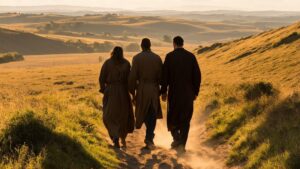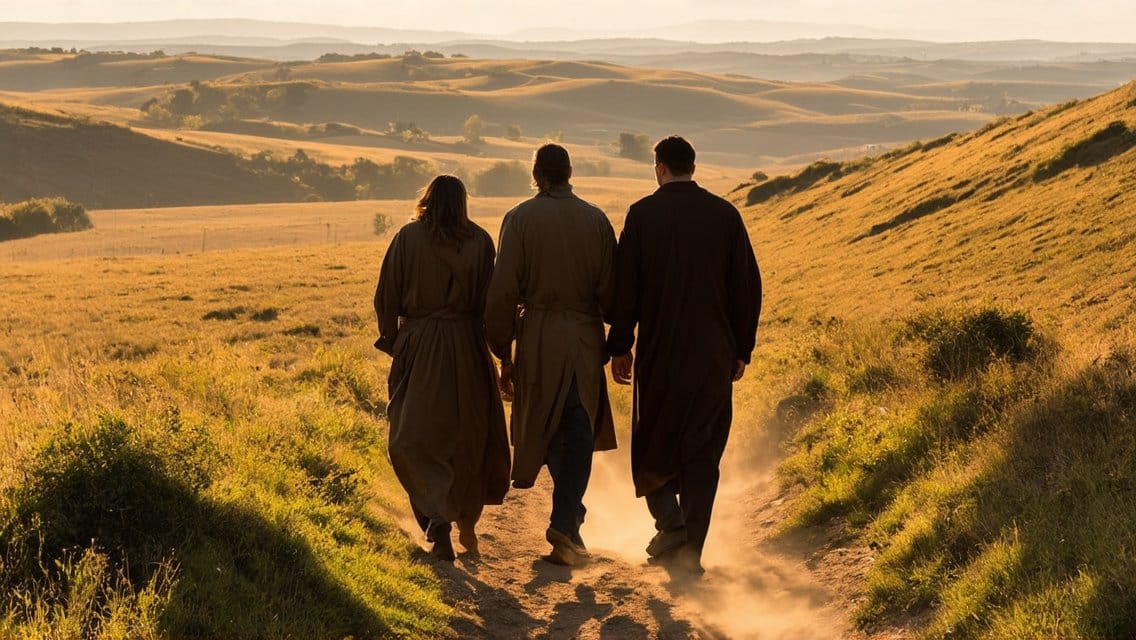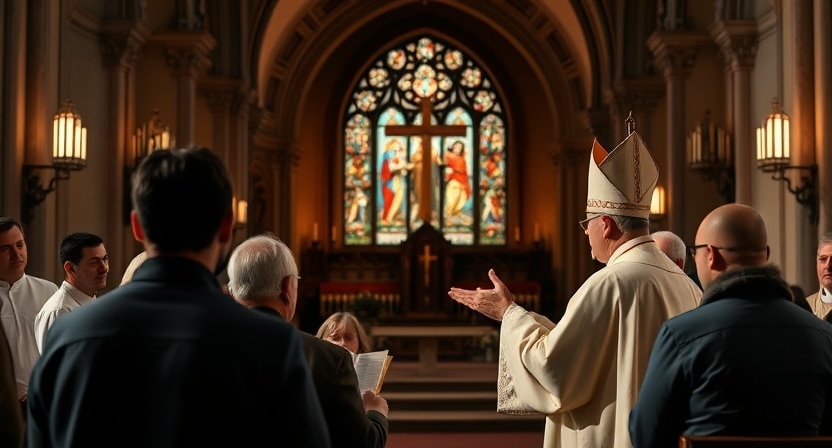THIRD SUNDAY OF EASTER
Story-telling on the road to Emmaus
INTRODUCTION AND CONFITEOR
On Easter Sunday evening two disciples of Jesus were returning to
their native village. They were filled with sadness because the man on whom they had pinned their hopes had been executed. Then the risen Jesus joined them, opened their eyes, and turned their sadness into joy.
The risen Jesus stands among us as we gather in his name to celebrate the Eucharist. He will turn our sorrows into joy. [Pause]
Lord, you speak to us when the Scriptures are read. Lord, have mercy.
We recognise you when we break the bread of the Eucharist. Christ, have mercy.
You console and comfort us by joining us at dark moments on the
road of life. Lord, have mercy.
HEADINGS FOR READINGS
First Reading (Acts 2: 14 ;22—28). This is part of a sermon preached by Peter to the Jews on the feast of Pentecost. It shows that the resurrection of Jesus from the dead is the very heart of the Good News.
Second Reading (1 Peter 1:17-21). The benefits we enjoy as Christians were won by Christ through the shedding of his blood. We must try to respond with a life of holiness.
Gospel (Luke 24:13—35). This contains the story of two men whose dreams had been shattered when Jesus was executed, how the risen Jesus joined them and showed them that it was by dying that he entered his glory.
1st Reading – Acts 2:14, 22-33
14 But Peter standing up with the eleven, lifted up his voice, and spoke to them: “You who are Jews, indeed all of you staying in Jerusalem. Let this be known to you, and listen to my words.
22 Ye men of Israel, hear these words: Jesus of Nazareth, a man approved of God among you, by miracles, and wonders, and signs, which God did by him, in the midst of you, as you also know:
23 This same being delivered up, by the determinate counsel and foreknowledge of God, you by the hands of wicked men have crucified and slain.

24 Whom God has raised up, having loosed the sorrows of hell, as it was impossible that he should be holden by it.
25 For David said concerning him: I foresaw the Lord before my face: because he is at my right hand, that I may not be moved.
26 For this my heart has been glad, and any tongue has rejoiced: moreover my flesh also shall rest in hope.
27 Because you will not leave my soul in hell, nor suffer thy Holy One to see corruption.
28 You have made known to me the ways of life: you shall make me full of joy with thy countenance.
29 Ye men, brethren, let me freely speak to you of the patriarch David; that he died, and was buried; and his tomb is with us to this present day.
30 Whereas therefore he was a prophet, and knew that God has sworn to him with an oath, that of the fruit of his loins one should sit upon his throne.
31 Foreseeing this, he spoke of the resurrection of Christ. For neither was he left in hell, neither did his flesh see corruption.
32 This Jesus has God raised again, whereof all we are witnesses.
33 Being exalted therefore by the right hand of God, and having received of the Father the promise of the Holy Ghost, he has poured forth this which you see and hear.
Responsorial Psalm – Psalms 16:1-2, 5, 7-8, 9-10, 11
R. (11a) Lord, you will show us the path of life.
or:
R. Alleluia.
1 Keep me, O God, for in you I take refuge;
2 I say to the LORD, “My Lord are you.”
5 O LORD, my allotted portion and my cup,
you it is who hold fast my lot.
R. Lord, you will show us the path of life.
or:
R. Alleluia.
7 I bless the LORD who counsels me;
even in the night my heart exhorts me.
8 I set the LORD ever before me;
with him at my right hand I shall not be disturbed.
R. Lord, you will show us the path of life.
or:
R. Alleluia.
9 Therefore my heart is glad and my soul rejoices,
my body, too, abides in confidence;
10 because you will not abandon my soul to the netherworld,
nor will you suffer your faithful one to undergo corruption.
R. Lord, you will show us the path of life.
or:
R. Alleluia.
11 You will show me the path to life,
abounding joy in your presence,
the delights at your right hand forever.
R. Lord, you will show us the path of life.
or:
R. Alleluia.
2nd Reading – 1 Peter 1:17-21
17 Beloved: if you invoke as Father him who, without respect of persons, judges according to everyone’s work: converse in fear during the time of your sojourning here.
18 Knowing that you were not redeemed with corruptible things as gold or silver, from your vain conversation of the tradition of your fathers:
19 But with the precious blood of Christ, as of a lamb unspotted and undefiled,
20 Foreknown indeed before the foundation of the world, but manifested in the last times for you,
21 Who through him are faithful in God, who raised him up from the dead, and has given him glory, that your faith and hope might be in God.
Alleluia – Luke 24:32
R. Alleluia, alleluia.
32 Lord Jesus, open the Scriptures to us;
make our hearts burn while you speak to us.
R. Alleluia, alleluia.
Gospel – Luke 24:13-35
13 And behold, two of Jesus’ disciples went, the same day, to a town which was seven miles from Jerusalem, named Emmaus.
14 And they talked together of all these things which had happened.
15 And it came to pass, that while they talked and reasoned with themselves, Jesus himself also drawing near, went with them.
16 But their eyes were held, that they should not know him.
17 And he said to them: What are these discourses that you hold one with another as you walk, and are sad?
18 And the one of them, whose name was Cleophas, answering, said to him: Art thou only a stranger to Jerusalem, and has not known the things that have been done there in these days?
19 To whom he said: What things? And they said: Concerning Jesus of Nazareth, who was a prophet, mighty in work and word before God and all the people;
20 And how our chief priests and princes delivered him to be condemned to death, and crucified him.
21 But we hoped, that it was he that should have redeemed Israel: and now besides all this, to day is the third day since these things were done.
22 Some women from our group, however, have astounded us: they were at the tomb early in the morning
23 And not finding his body, came, saying, that they had also seen a vision of angels, who say that he is alive.
24 And some of our people went to the tomb, and found it so as the women had said, but him they found not.
25 Then he said to them: O foolish, and slow of heart to believe in all things which the prophets have spoken.
26 Ought not Christ to have suffered these things, and so to enter into his glory?
27 And beginning at Moses and all the prophets, he expounded to them in all the scriptures, the things that were concerning him.
28 And they drew night to the town, where they were going: and he made as though he would go farther.
29 But they constrained him; saying: Stay with us, because it is towards evening, and the day is now far spent. And he went in with them.
30 And it happened that, while he was with them at table, he took bread, said the blessing, broke it, and gave it to them.
31 And their eyes were opened, and they knew him: and he vanished out of their sight.
32 And they said one to the other: Was not our heart burning within us, whilst he spoke in this way, and opened to us the scriptures?
33 And rising up, the same hour, they went back to Jerusalem: and they found the eleven gathered together, and those that were staying with them,
34 Saying: The Lord is risen indeed, and has appeared to Simon.
35 And they told what things were done in the way; and how they knew him in the breaking of the bread.
HOMILY
Each of us has a story to tell, the story of our life. It’s one story that
should be told. To tell one’s story is to own it. To own it is to accept it in all its entirety, good and bad, bright and dark sides alike. When life is happy, we find it easy to accept and tell our story. It bubbles out of us like water from a boiling pot. But when life is sad, the opposite happens. We tend to close up and cut ourselves oft. Yet it is especially in the dark moments that we need to tell our story to a sympathetic ear.
People can get so bogged down that they can’t see any way forward. Things can get so dark that they can’t see any light. They can feel so bad about themselves that they are crushed by shame and guilt. Or they can be hurting so much that they are overcome with loneliness, frustration, and anguish. There is literally no hope for such people unless ’they tell their story to someone who will listen with patience, understanding, and love.
Some time ago a man walked into a London hotel. He was aged about thirty-five, was well dressed, carried a suitcase with a change of clothes, and spoke with a Scottish accent. He seemed absolutely normal until he asked to book in. When he was given the register to sign, he got all confused.
‘What’s the matter?’ asked the receptionist.
‘I can’t remember my name,’ the man answered.
He was suffering from amnesia or loss of memory. They searched his pockets for a clue to his identity but found none. He had no idea who he was or where he had come from. All his past was wiped out. He was confused, desperate, and frightened. Only his old skills were retained. Thanks to these he was able to cope with the real world.
Lucky for him, when he was taken to hospital he met a psychologist who recognised his condition and took him seriously. Slowly and patiently, over weeks and months, he coaxed him to recall anything, however small, from his past. He gave him the feeling that no matter how painful the truth might he, it would be okay. The psychologist suspected that there was something the man wanted to forget, and he was proved absolutely right.
The story that came out was a sad one and, though deep down the man ached to tell it, it didn’t come easy. By telling it he was forced to go back into the world where he had suffered, sinned, and suffered again, a world which he had left without understanding it, and hating it. Telling his story took him into areas which up to now had been ‘no-go’ areas. It was both painful and humiliating to see his self-esteem melt away like snow before the sun. Anyway, here in brief is the story he told.
He was an orphan and had been brought up in an institution. He married a rich girl and lived in her parents’ house. She didn’t need the money he earned as a plumber. Her people despised him, so that he felt redundant and unwanted. So it was that he started an affair with a poorer girl. Just as he was about to walk out on his wife she got very sick. A terrible conflict arose in his mind. The only way he could cope was to blot out everything. He lost his memory.
This is of course an extreme and pretty rare example. But many sad cases happen, if not as desperate as this one. If such people do not get a chance to tell their story, there is little hope that they will achieve the happiness that comes from self-acceptance. Everybody’s story, even that of the most hopeless derelict or desperate criminal, deserves to be listened to with respect, because it is his or her story. It is terrible to want to tell your story and to meet with resistance or indifference. I am my story. Therefore, if you reject my story, you reject me. To tell one’s story is to say: ‘Look, this is the sort of person I am’.
Today’s Gospel is all about story-telling. Those two disciples had a story to tell, one full of disappointment» and disillusionment. It was really bothering them. Jesus showed such delicacy by joining them as a stranger. People often find it easier to unburden on a stranger. Straightaway he showed an interest in their lives by asking them what they were talking about. Thus he created a climate in which they felt like talking. And they did talk. They poured out their sad story to him.
Then what did he do? He began to tell his own story. For them the cross had been an insurmountable obstacle. It had signaled the end of their interest in Christ. But now Christ showed them how the Scriptures had foretold the cross. He showed them that the cross, far from being the end of the dream, was paradoxically the means by which it became a reality. He helped them to find a meaning in their story by showing them the meaning he had found in his own. Thus he enabled them to turn their lives around.
As said earlier, everybody has a story to tell. Everybody wants to be taken seriously. Alas, many never get a chance to tell their stories. They never encounter someone to whom they can unwind, someone who will listen to their story and say: ‘It’s okay’. To accept one’s story means there is no longer any room for self-hatred. It is especially by accepting the dark side of our story that we learn what God’s grace and love are all about. However, in the final analysis it is only the, Christ Story (glory achieved through a sharing in his suffering and death) that helps us to make ultimate sense of our own story. Anything else is simply not adequate.
Every human story is the story of a journey, the journey of life. Christ is with us on this journey, even when we don’t recognise him. But we must not see our journey in isolation any more. We are members of the people of God. This means we make the journey to the Father’s Kingdom together.
’Wherever people have lived there is a story to be told’.(Thoreau).
’In hospital everybody tells you their story’. (So said my friend, Imelda Black, after she had come out of hospital).
PRAYER OF THE FAITHFUL
Jesus entered his glory by undergoing the pain and shame of the cross. Let us pray for the courage to follow him along the path of sacrifice and self~denial, so that one day we may share in his glory. R. Stay with us, Lord.
For the leaders of the Church: that they may not seek a life of comfort and ease. [Pause] Let us pray to the Lord.
For our political leaders: that they may never take the easy way and so abandon the right way. [Pause] Let us pray to the Lord. For those who are disappointed and disillusioned: that Christ may give them hope. [Pause] Let us pray to the Lord.
That especially in dark moments we may be conscious of Christ’s presence at our side on the road of life. [Pause] Let us pray to the Lord. ‘
For local needs.
Let us pray: ‘
Heavenly Father, your Son proved his love for you and for us by undergoing a humiliating death. You rewarded him by raising him from the dead and setting him at your right hand in glory. Help us to follow him faithfully in this life so that we may share his glory in the next. We ask this through the same Christ our Lord.
COMMUNION REFLECTION
All through life’s day
our risen Lord walks with us.
Often, however, he is a stranger to us,
for he never forces himself upon us.
Before the day’s end
we will ask many questions,
experience many failures,
disappointments and heartaches.
And then, suddenly,
whether we are young, middle-aged, or old,
we will find that the day is far spent,
the shadows are lengthening,
and night is fast approaching.
In that moment we pray
that, like the two disciples on the road to Emmaus,
our eyes will be opened,
and that we will recognise him –
the stranger who walked by our side –
as our risen Lord.
And he will not vanish from our sight.
Instead he will be our guide
as we travel through the dark valley of death,
until we arrive safely at our Father’s house.


